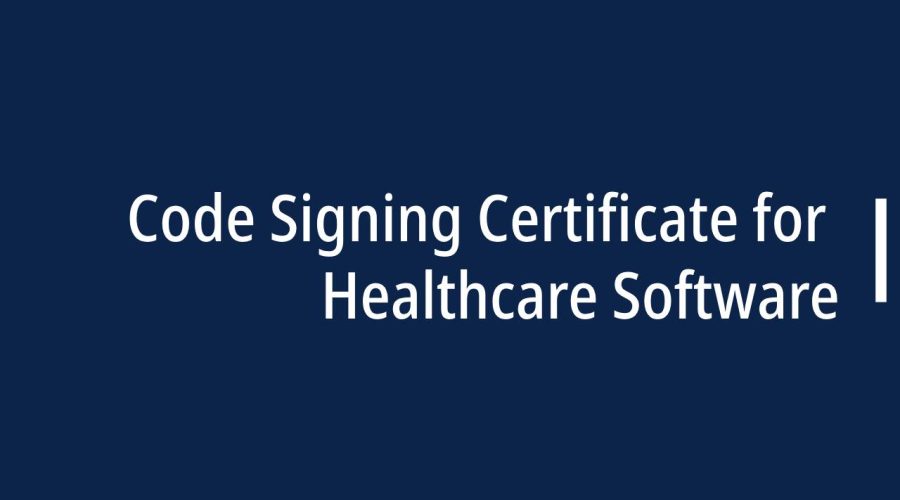In the healthcare industry, the use of software is integral to providing efficient, accurate, and secure healthcare services. Healthcare software encompasses a wide range of applications, from electronic health records (EHRs) and medical imaging software to patient management systems and telemedicine platforms. However, with the increasing importance of digital health solutions, ensuring the security and integrity of healthcare software is paramount. This is where Code Signing Certificates play a critical role.
1. Code Integrity and Authenticity:
In the healthcare sector, the trustworthiness of software is of utmost importance. Patients, healthcare providers, and regulatory authorities need assurance that healthcare software is not only authentic but also unaltered. Code Signing Certificates provide this assurance by digitally signing the software, thereby confirming its integrity and authenticity.
- Ensuring Trust: Healthcare software is entrusted with sensitive and confidential patient data, making it essential to build trust among users. Code Signing Certificates serve as a seal of authenticity, assuring users that the software is from a legitimate source.
2. Protection Against Malware:
Healthcare software, because of its access to critical patient data, is a prime target for cyberattacks and malware. Code Signing Certificates play a vital role in mitigating these risks.
- Detection of Tampering: Code Signing Certificates use digital signatures to detect any unauthorized changes to the software. Even the slightest alteration to the code will render the signature invalid, alerting users to a potential security breach.
- Mitigating Risks: In the healthcare sector, the risks associated with malware are particularly concerning. Malicious software can lead to data breaches, theft of patient records, or even compromise the functionality of medical devices. Code Signing helps mitigate these risks and acts as a proactive defense mechanism.
3. Regulatory Compliance:
The healthcare industry is heavily regulated, with stringent data privacy and security requirements. Code Signing Certificates are instrumental in achieving regulatory compliance.
- HIPAA Compliance: In the United States, healthcare software must comply with the Health Insurance Portability and Accountability Act (HIPAA). HIPAA mandates strict data security measures, and Code Signing Certificates help meet these requirements.
- Data Privacy Regulations: Many countries have enacted data protection regulations such as GDPR (General Data Protection Regulation) in the European Union. Compliance with these regulations often includes ensuring the integrity and authenticity of healthcare software through code signing.
4. Patient Safety:
The reliability and safety of healthcare software are of paramount importance, especially when it comes to software that controls medical devices or influences clinical decisions.
- Reliability: Healthcare software must operate reliably and without interference. Any compromise in its code can have life-threatening consequences.
- Preventing Counterfeit Devices: In the case of medical devices, the use of Code Signing Certificates helps prevent counterfeit devices from running unauthorized and potentially harmful software. This ensures that only authenticated and approved software can interact with medical equipment.
5. Enhancing User Experience:
A positive user experience is vital in healthcare software adoption. Users must have confidence in the security and integrity of the software.
- User Confidence: When users see that healthcare software is signed with a Code Signing Certificate, it instills confidence. Users are more likely to adopt and use healthcare applications when they can trust their security.
- Reducing Warning Messages: Without code signing, users may receive warning messages from their operating systems or antivirus software, which can create confusion and lead to non-adoption of the software. Code signing helps in reducing these warning messages, providing a smoother user experience.
6. Secure Software Updates:
Healthcare software often requires timely patches and updates to address security vulnerabilities or enhance functionality. Code Signing Certificates are essential for secure software updates.
- Trusted Updates: Code Signing Certificates ensure that updates and patches are trusted and haven’t been altered during distribution. This guarantees that users are receiving genuine and secure updates.
7. Brand Reputation:
In healthcare, brand reputation is invaluable. A security breach, data loss, or compromised software can tarnish a healthcare provider’s reputation and result in loss of trust.
- Protecting Reputation: Code Signing Certificates play a crucial role in protecting the reputation of healthcare providers and software developers. By demonstrating a commitment to security, they reassure users and stakeholders.
- Legal Implications: Security breaches can have legal repercussions, leading to lawsuits, fines, and regulatory investigations. The use of Code Signing Certificates demonstrates due diligence in protecting patient data and can be a critical factor in avoiding legal complications.
In conclusion, Code Signing Certificates are of paramount importance for healthcare software. They provide assurance of software integrity, protect against malware, ensure regulatory compliance, enhance patient safety, and contribute to a positive user experience. Healthcare software must prioritize security and data integrity, and Code Signing Certificates are a fundamental component in achieving this goal. In an industry where patient safety and data security are non-negotiable, Code Signing Certificates are an essential safeguard.

Gloria Bradford is a renowned expert in the field of encryption, widely recognized for her pioneering work in safeguarding digital information and communication. With a career spanning over two decades, she has played a pivotal role in shaping the landscape of cybersecurity and data protection.
Throughout her illustrious career, Gloria has occupied key roles in both private industry and government agencies. Her expertise has been instrumental in developing state-of-the-art encryption and code signing technologies that have fortified digital fortresses against the relentless tide of cyber threats.
